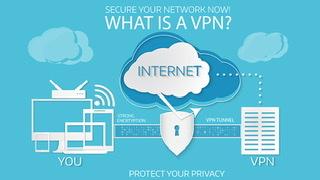6. Subscribe to a Virtual Private Network (VPN) Service
Using a VPN (virtual private network) is one of the simplest and most effective ways to protect your privacy, secure your devices, and also access blocked/censored content online. A VPN creates an encrypted tunnel between your device and the VPN server that substitutes your actual IP address with one assigned by the VPN server that .  The VPN server-assigned IP address becomes the IP address that all Internet site that you visit during your connection time. This masks / hides your actual IP address from any web sites you visit giving you a degree of privacy and security.
The VPN server-assigned IP address becomes the IP address that all Internet site that you visit during your connection time. This masks / hides your actual IP address from any web sites you visit giving you a degree of privacy and security.
There are many reliable, reputable VPN service providers spread throughout the world. As such, it is important to know where the provider’s business offices are located for legal jurisdiction purposes, since legal protection for digital data privacy rights vary greatly from country to country. All VPN providers offer a range of services with varying levels of privacy and security protections, so it is important to determine your privacy and security needs when selecting a VPN service provider.
But beware of VPN providers offering “Free!” services – while some are legitimate responsible businesses (like ProtonVPN), many free VPN providers often collect and sell user data, have very few servers, offer limited bandwidth, and collect/maintain extensive logs of user activity – some are outright scams and various marketing gimmicks.
The best providers are ones who openly and clearly spell out their subscriber privacy commitments, such as no logging of user activity, encryption of all records, policy on disclosing logs to law enforcement, etc.
VPNs can range in price from $2.99 per month (NordVPN) up to $12.99 per month (Perfect Privacy) . When you purchase a VPN subscription you will be able to use the VPN on various operating systems and devices, from computers and tablets to phones and routers.
If you're serious about maintaining your anonymity, consider investing in a VPN solution like ProtonVPN, TorGuard, or Private Internet Access. While the protection isn't perfect, they will help you to disguise your activities online. Your real IP address will be hidden from the world, and your traffic will remain indecipherable to nosy ISPs or governments. Even if your country is actively on the lookout for VPN traffic, you can still benefit from so-called "stealth VPNs." TorGuard offers its stealth VPN service at no additional cost, and it will make government detection and interference much harder to accomplish. For those of you being held hostage by your government, VPNs are by far the best bet for bypassing censorship and snooping.
Note that the “best VPN” solution will differ for each person based on unique needs, service cost, bandwidth requirements, and privacy circumstances. For an in-depth overview of all the different VPN router options, see this VPN router guide.
If you are tech savvy, a less expensive way to secure your entire home network and all devices, is to use a router (either WiFi or hardwired) that incorporates firewall and VPN capabilities. A good VPN router will:
Extend the benefits of a VPN to all your devices without installing software
Protect you against mass surveillance and internet service provider (ISP) spying
Secure your home network against attacks, hacking, and spying
Unlock the entire internet, allowing you to skirt geographic restrictions, blocks, and censorship
The only reasonably priced consumer brand currently offering a large selection VPN-enabled routers is Asus. The default Asus firmware, which is called ASUSWRT, supports OpenVPN, PPTP, and L2TP right out of the box (no flashing required). The Asus RT-AC68U is an excellent choice.
There are numerous brands offering business-grade routers that incorporate both firewall, router, and VPN capability, but these can be quite costly, especially if you by a support subscription. They are usually more complex to set up and manage. The Fortinet FortiGate E30 and WatchGuard Firebox T15 two good options if you want this increased degree of protection.
When choosing a router, the biggest consideration is processing power (CPU). Running a VPN on a router is a very CPU-intensive task requiring the router to process lots of encrypted data. For these reasons, it’s typically good to go with a router that’s at least 800 Mhz or more.
Beware: choosing this solution makes you responsible for all maintenance — this includes updating router/VPN software security updates, setting up strong password policies, setting security intrusion alerts and reviewing the logs, etc. So while it may be lower cost than a VPN service subscription fee, it will require more of your time to keep the VPN service secure and protected.
